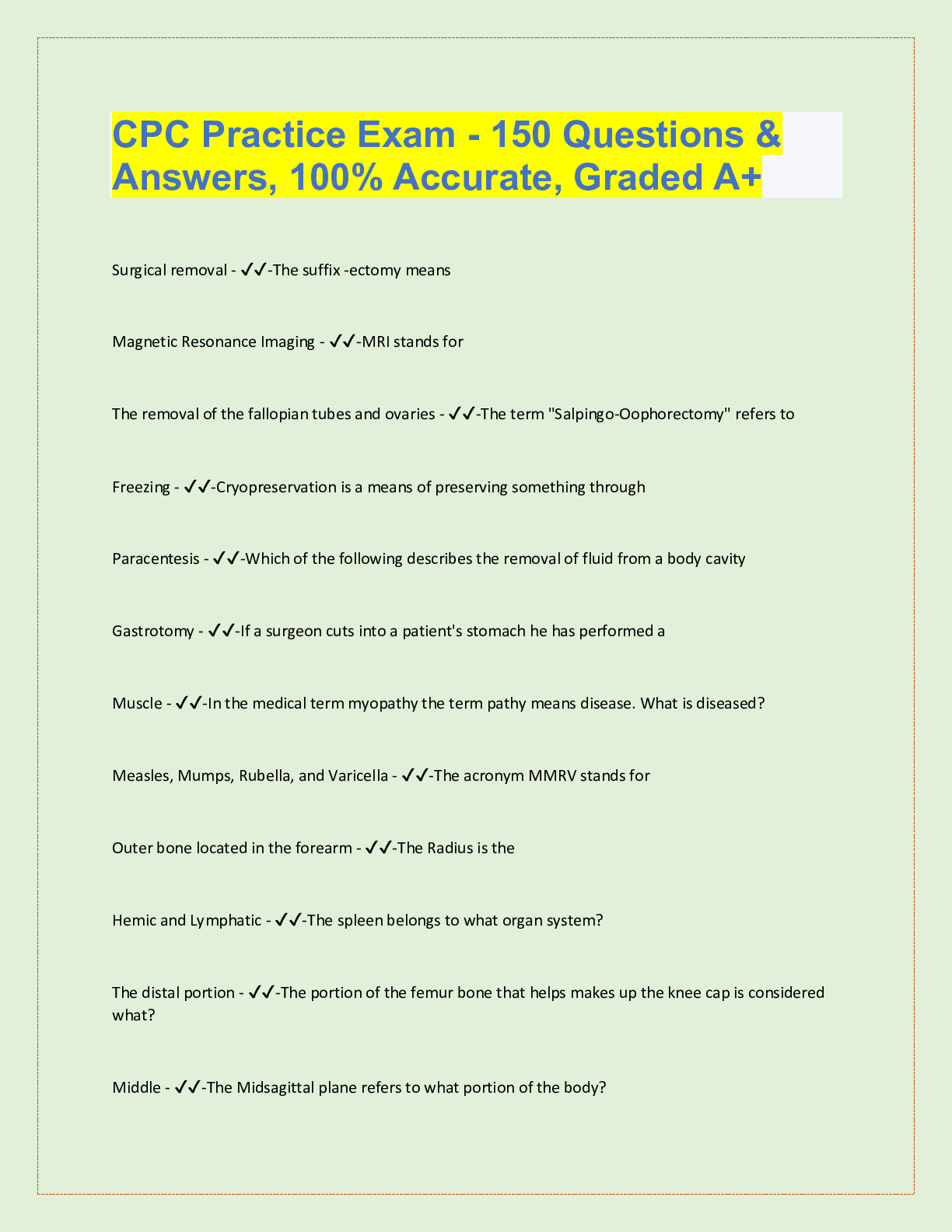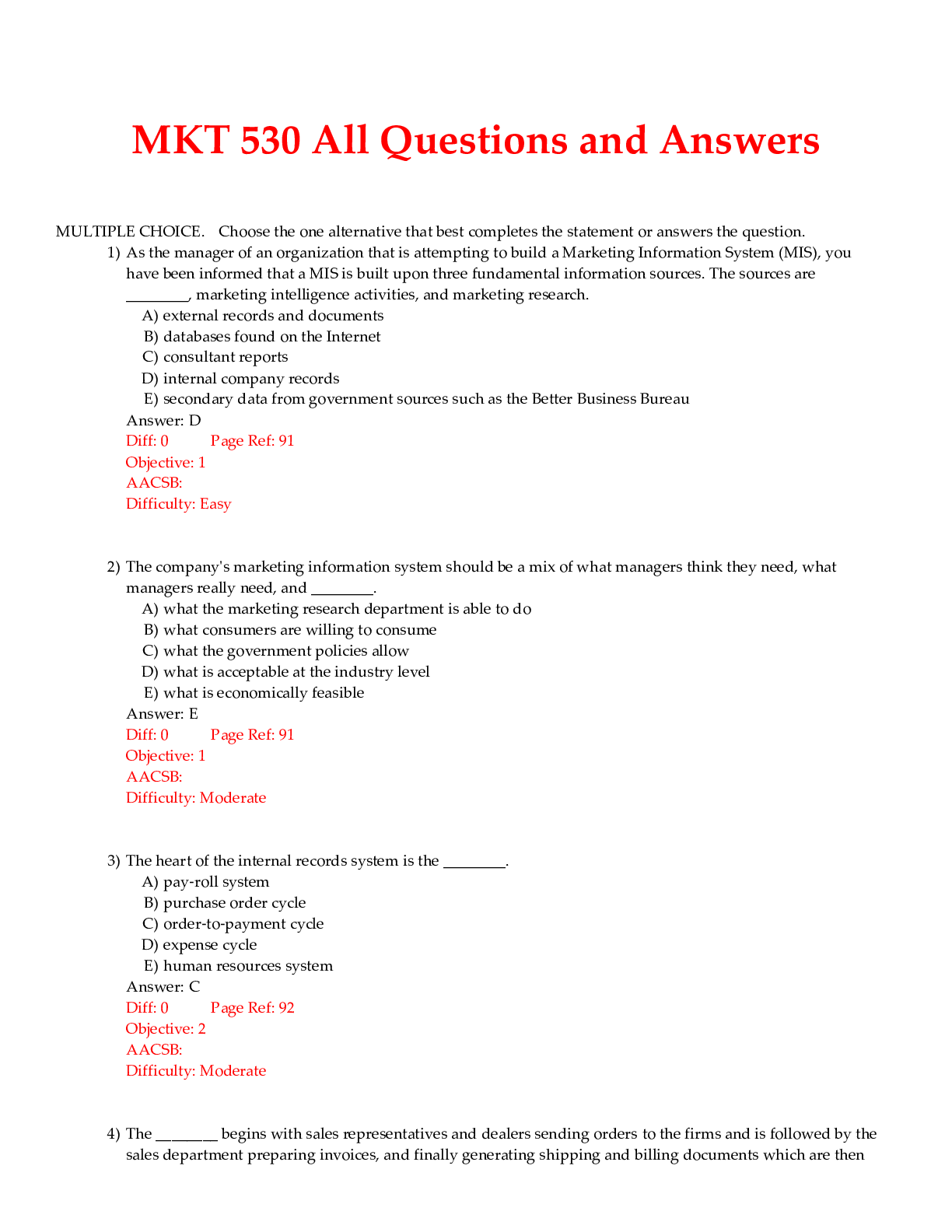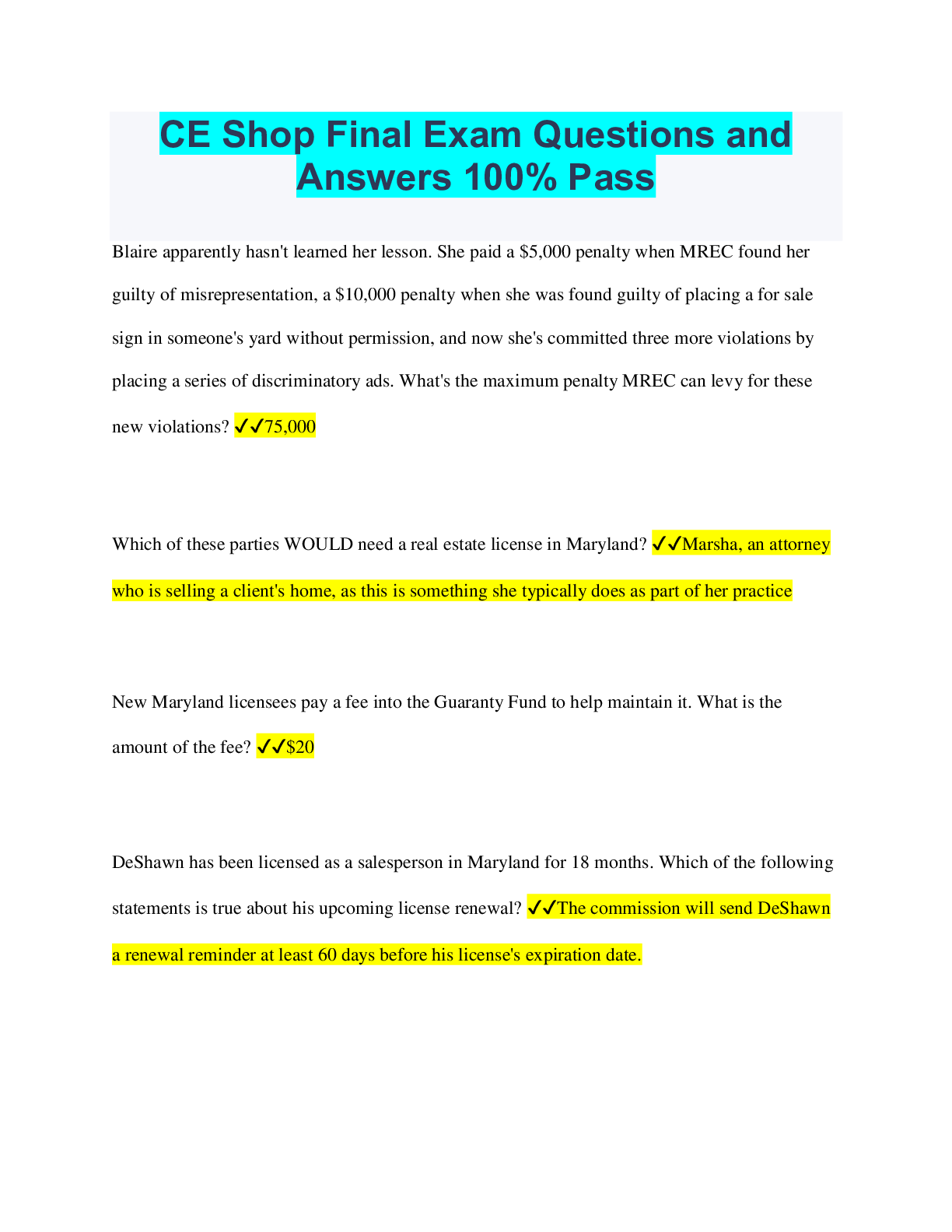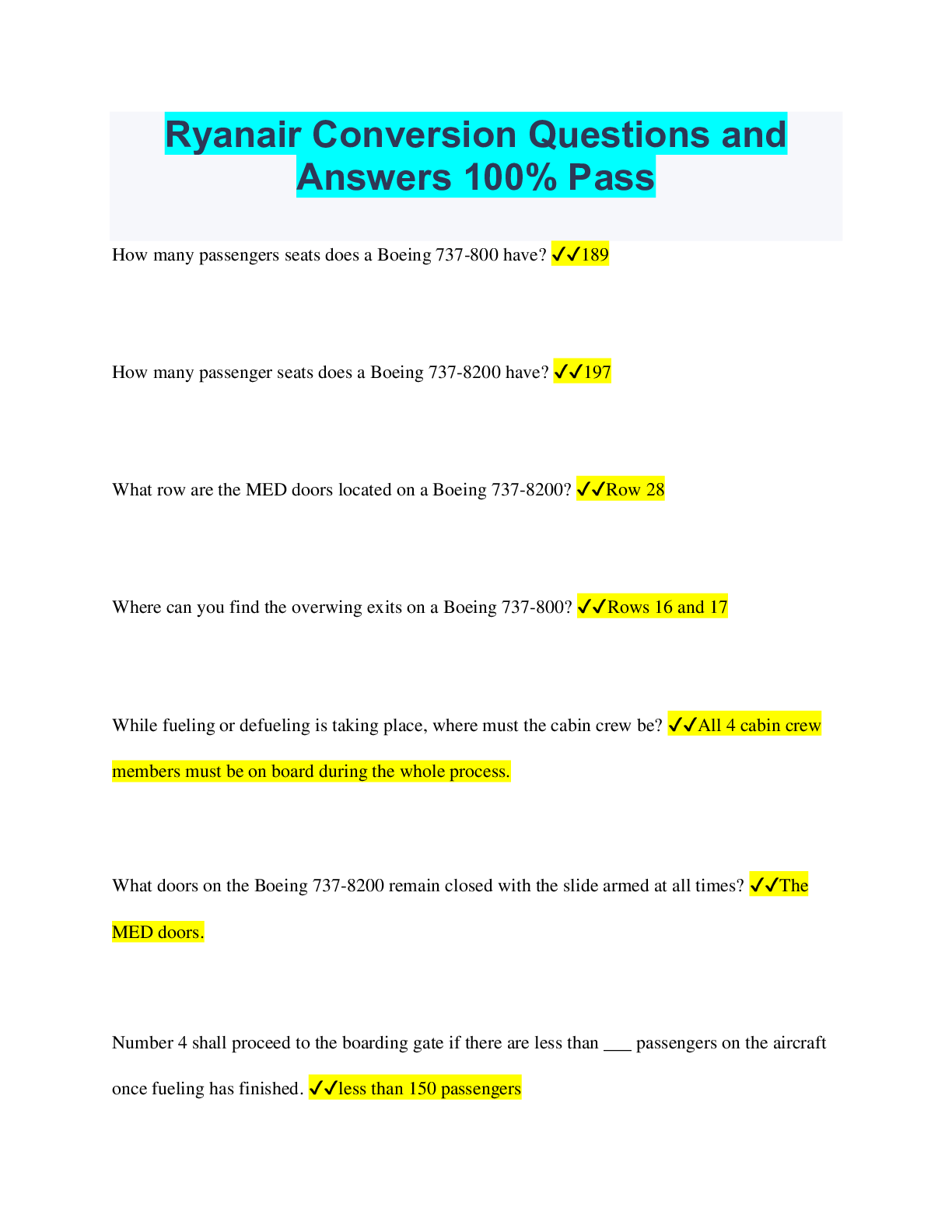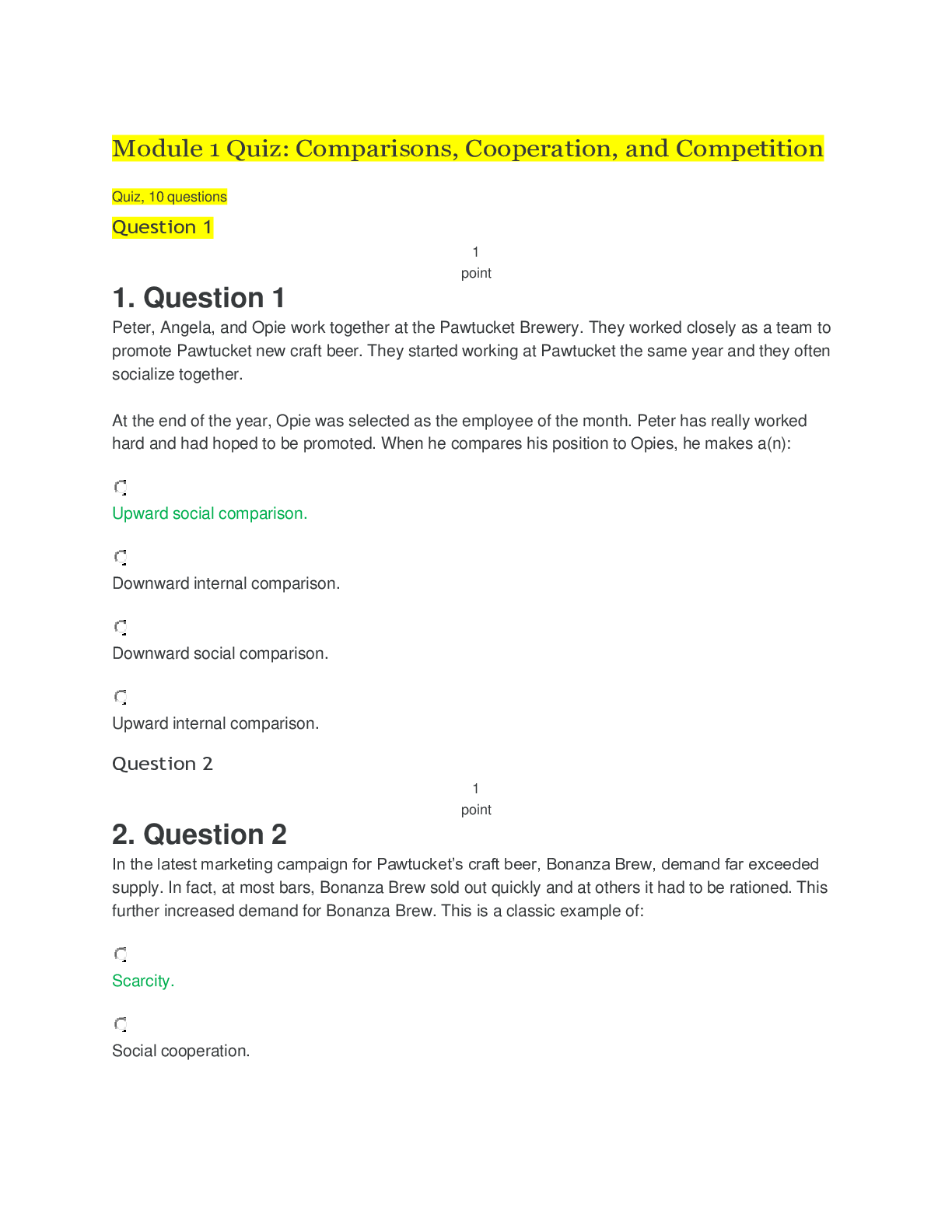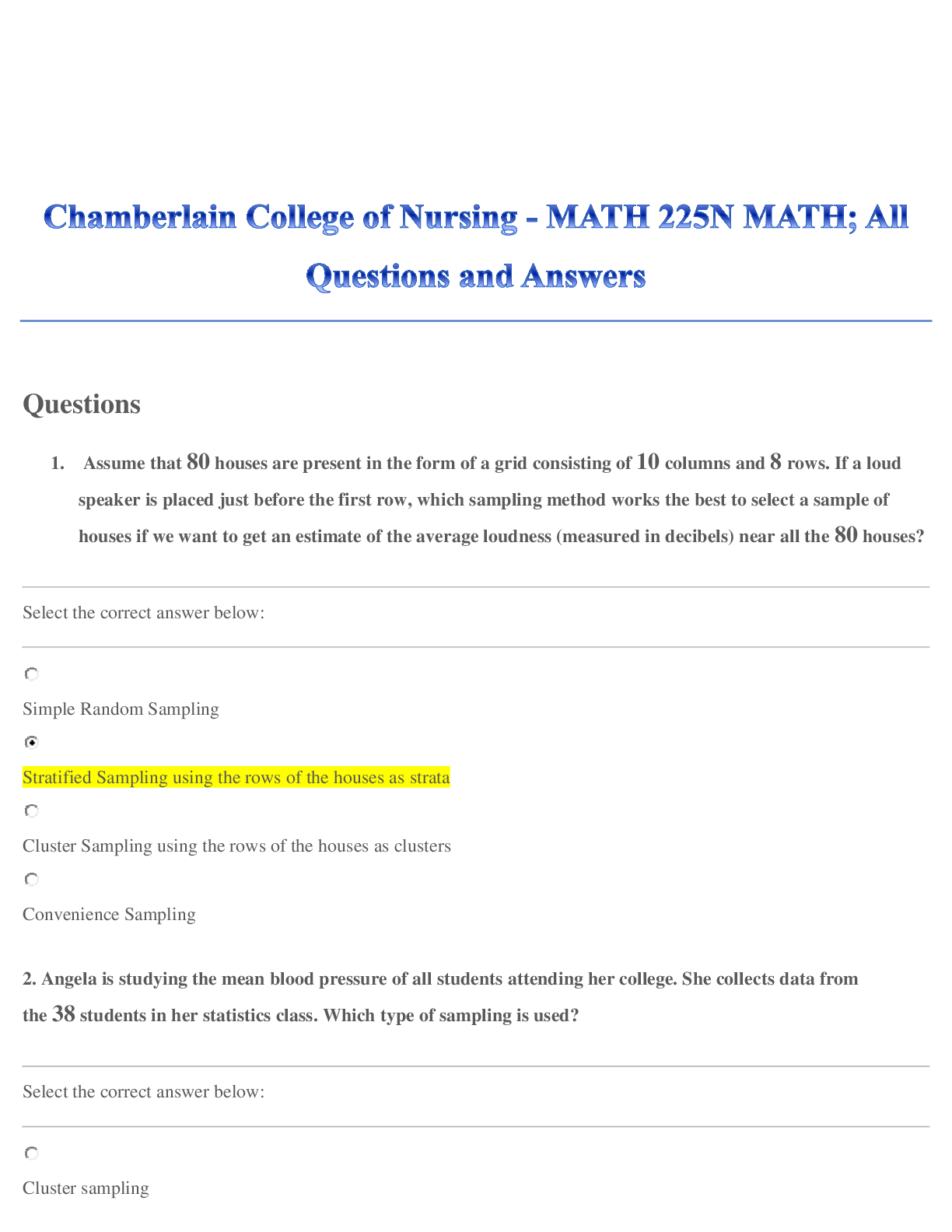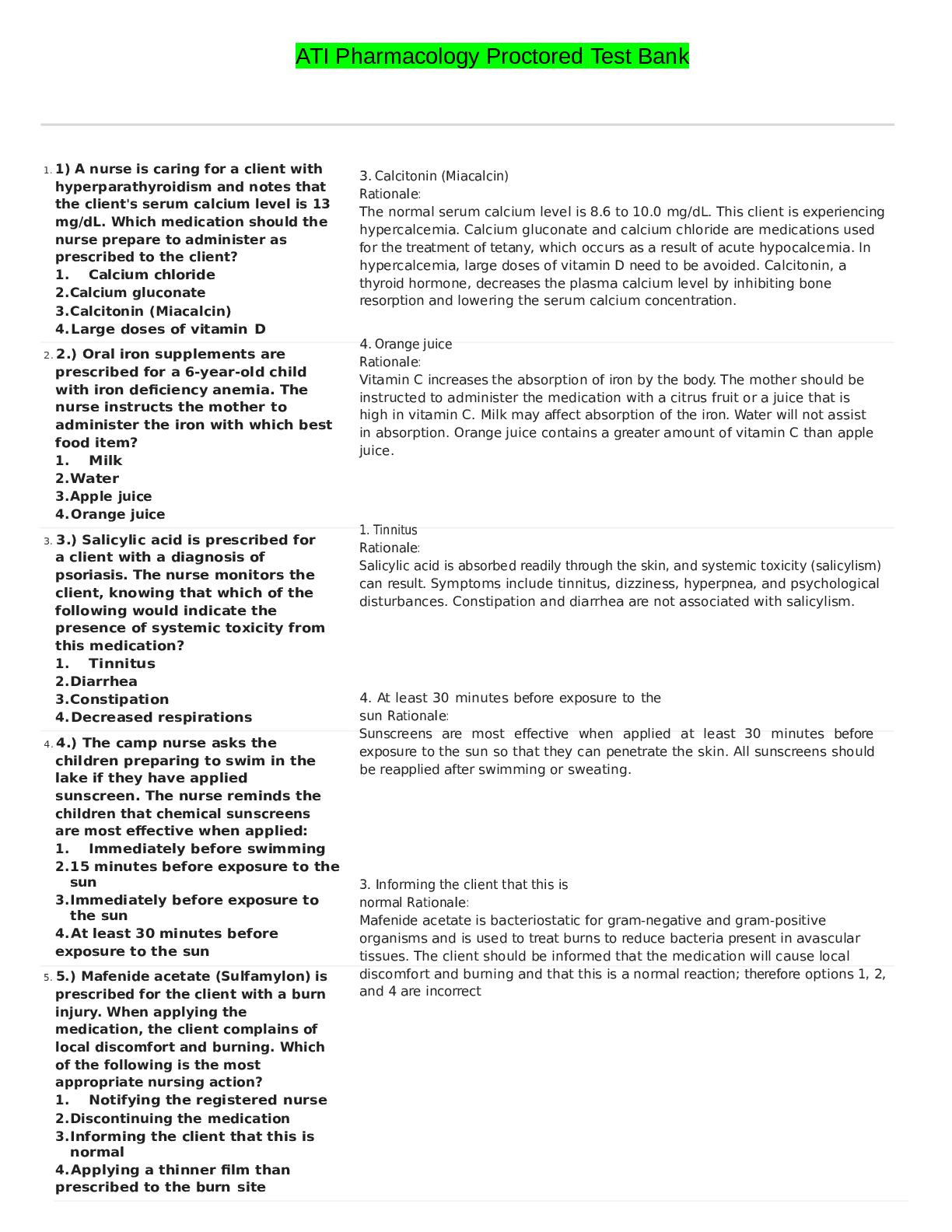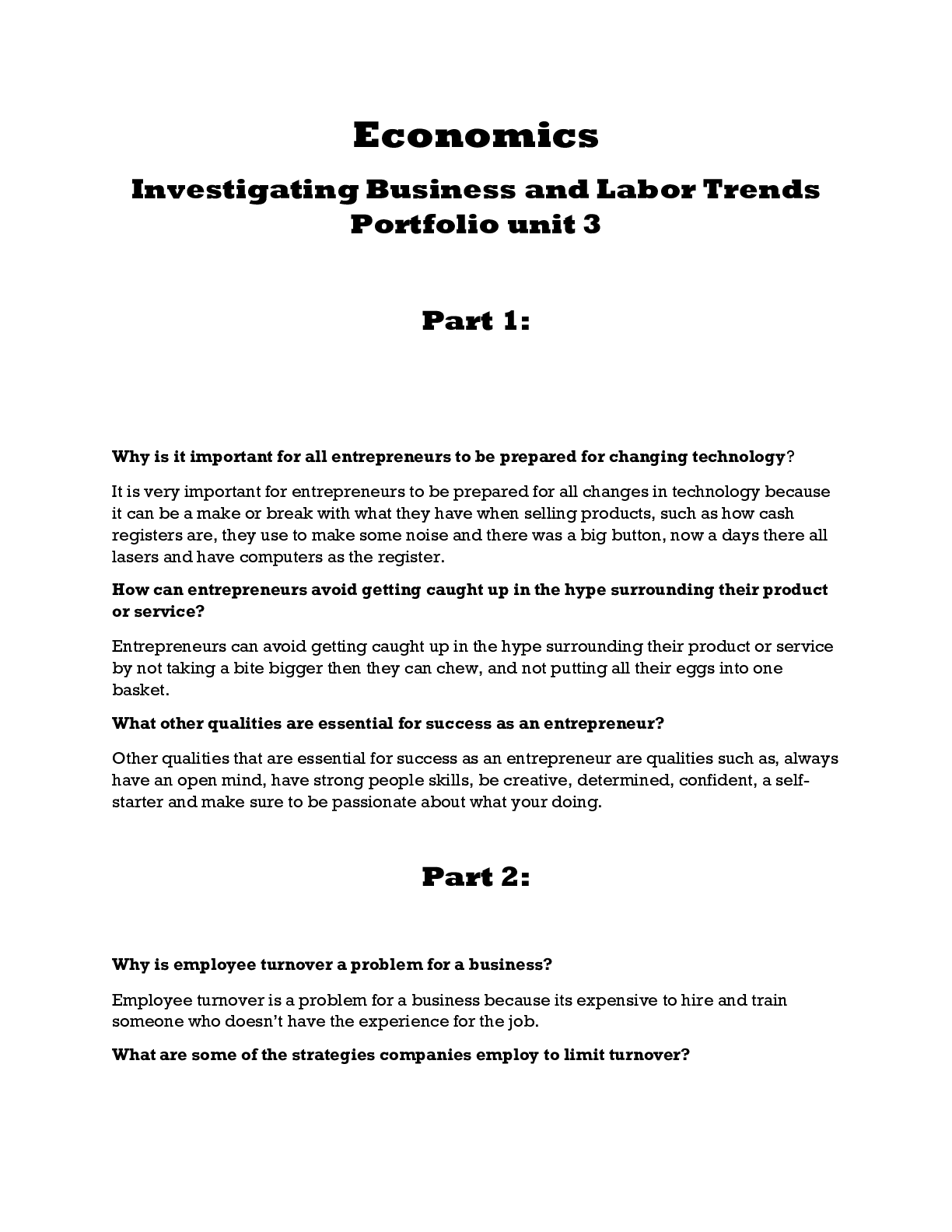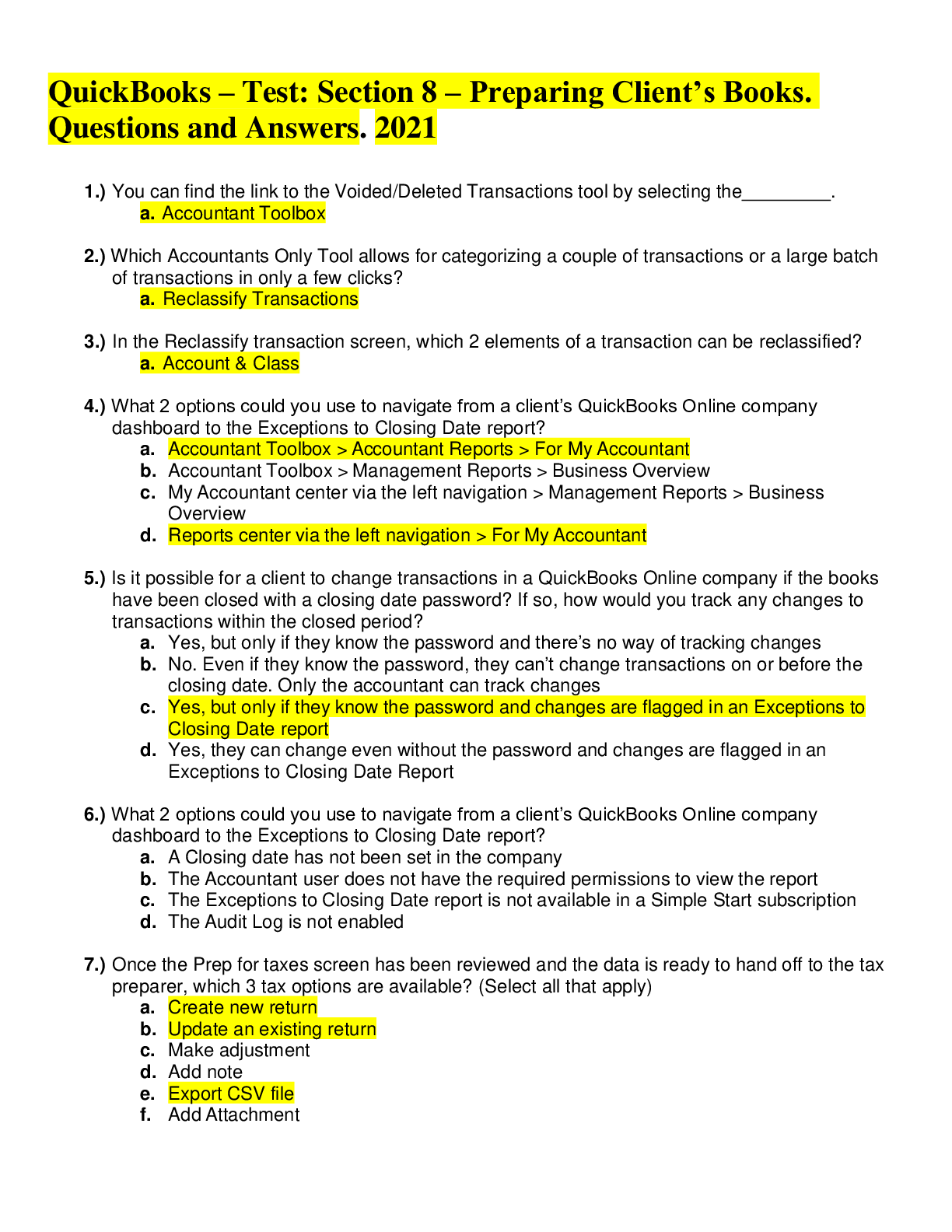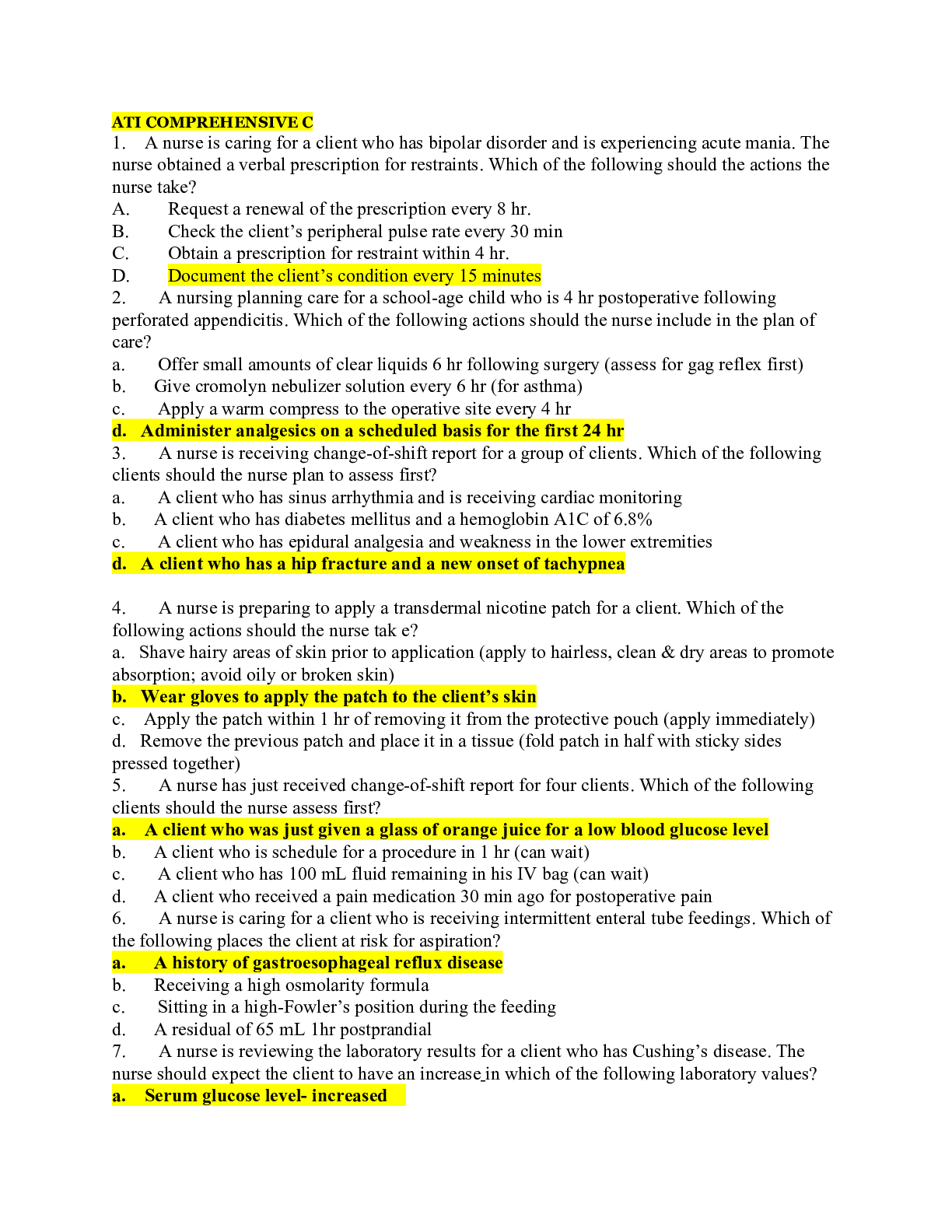*NURSING > QUESTIONS & ANSWERS > S2 STEMI ATI (solved) Complete questions and answers 2021 (All)
S2 STEMI ATI (solved) Complete questions and answers 2021
Document Content and Description Below
S2 STEMI ATI 1. A client who has a history of myocardial infarction (MI) is prescribed aspirin 325 mg. The nurse recognizes that the aspirin is given due to which of the following actions of ... the medication? A. analgesic B. anti-inflammatory C. antiplatelet aggregate D. antipyretic 2. A nurse is teaching the partner of a client who had an acute myocardial infarction (MI) about the reason blood was drawn from the client. Which of the following statements should the nurse make regarding cardiac enzymes studies? A. "These tests help determine the degree of damage to the heart tissues." B. "Cardiac enzymes will identify the location of the MI." C. "These tests will enable the provider to determine the heart structure and mobility of the heart valves." D. "Cardiac enzymes assist in diagnosing the presence of pulmonary congestion." 3. A nurse is caring for a client who has had a myocardial infarction. Upon his first visit to cardiac rehabilitation, he tells the nurse that he doesn't understand why he needs to be there because there is nothing more to do, as the damage is done. Which of the following is the correct nursing response? A. "Cardiac rehabilitation cannot undo the damage to your heart but it can help you get back to your previous level of activity safely." B. "It’s not unusual to feel that way at first, but once you learn the routine, you’ll enjoy it." C. "Exercise is good for you and good for your heart." D. "Your doctor is the expert here, and I’m sure he would only recommend what is best for you." 4. A nurse is admitting a client who has acute heart failure following myocardial infarction (MI). The nurse recognizes that which of the following prescriptions by the provider requires clarification? A. Morphine sulfate 2 mg IV bolus every 2 hr PRN pain B. Laboratory testing of serum potassium upon admission C. 0.9% normal saline IV at 50 mL/hr continuous D. Bumetanide 1 mg IV bolus every 12 hr 5. A nurse is caring for a client who came to the emergency department reporting chest pain. The provider suspects a myocardial infarction. While waiting for the troponin levels report, the client asks what this blood test will show. Which of the following explanations should the nurse provide the client? A. Troponin is an enzyme that indicates damage to brain, heart, and skeletal muscle tissues. B. Troponin is a lipid whose levels reflect the risk for coronary artery disease. C. Troponin is a heart muscle protein that appears in the bloodstream when there is damage to the heart. D. Troponin is a protein that helps transport oxygen throughout the body. 6. A nurse is caring for a client who reports a new onset of severe chest pain. Which of the following actions should the nurse take to determine if the client is experiencing a myocardial infarction? A. Check the client's blood pressure. B. Auscultate heart tones. C. Perform a 12-lead ECG D. Determine if pain radiates to the left arm. 7. A nurse in the emergency room is caring for a client who presents with manifestations that indicate a myocardial infarction. Which of the following prescriptions should the nurse take first? A. Attach the leads for a 12-lead ECG. B. Obtain a blood sample. C. Initiate oxygen therapy. D. Insert the IV catheter. 8. A nurse in an emergency department is planning care for a client who is having an acute myocardial infarction (MI). The nurse should plan to administer which of the following medications after the initial acute phase to manage the client's pain and anxiety? A. Nitroglycerin B. Aspirin C. Oxygen D. Morphine 9. A nurse is monitoring an older adult female client who had a myocardial infarction (MI) for the development of an acute kidney injury. Which of the following findings should the nurse identify as indicating an increased risk of acute kidney injury (AKI)? A. Serum creatinine 1.8 mg/dL B. Serum Osmolality 290 mOsm/kg H2O C. Blood urea nitrogen (BUN) 20mg/dL D. Magnesium 2.0 mEq/L 10. A nurse is reviewing the laboratory values of a client who had a myocardial infarction 3 hr ago. The nurse should expect which of the following laboratory values to be elevated? A. Aspartate aminotransferase (AST). B. Unconjugated bilirubin C. Troponin I D. Serum amylase 11. A nurse in an emergency department is caring for a client who reports substernal chest pain and dyspnea. The client is vomiting and is diaphoretic. Which of the following laboratory tests are used to diagnose a myocardial infarction? (Select all that apply.) A. Troponin I B. Troponin T C. Plasma low-density lipoproteins (LDL) D. CPK E. Myoglobin 12. A nurse in an emergency department is preparing to administer alteplase accelerated therapy to a client who is having a myocardial infarction. Which of the following actions should the nurse plan to take? (Select all that apply.) A. Administer the medication within 30 min of the client’s arrival to the department. B. Reconstitute the medication with sterile water. C. Administer a 15 mg IV bolus. D. Tell the client that the purpose of the medication is to keep a new clot from forming. E. Assess the client for back pain. 13. A nurse in an emergency department is assessing a client who is having a suspected acute myocardial infarction (MI). Which of the following manifestations should the nurse expect to find for a client experiencing an acute MI? (Select all that apply.) A. Orthopnea B. Headache C. Nausea D. Tachycardia E. Diaphoresis 14. A nurse is caring for a client who reports a new onset of chest pressure severe epigastric distress. The physician prescribes monitoring of creatine kinase (CK) isoenzymes. When should the nurse anticipate the CK isoenzymes will begin to rise if the client has had a myocardial infarction (MI)? (Select all that apply) A. 1 hr B. 2 hr C. 3 hr D. 24 hr 15. A nurse in the emergency department is caring for a client who reports chest pain, headache, and shortness of breath. He continues to state, “I don’t know why my wife left me.” The client receives a diagnosis of anxiety. The nurse realizes the client’s findings support which level of anxiety? A. Mild B. Moderate C. Severe D. Panic 16. A nurse in the emergency department is caring for a client who took 3 nitroglycerin tablets sublingually for chest pain. The client reports relief from the chest pain but now he is experiencing a headache. Which of the following statements should the nurse make? A. "A headache is an indication of an allergy to the medication." B. "A headache is an expected adverse effect of the medication." C. "A headache indicates tolerance to the medication." D. "A headache is likely due to the anxiety about the chest pain." 17. A nurse on a telemetry unit is caring for a client who has unstable angina and is reporting chest pain with a severity of 6 on a 0 to 10 scale. The nurse administers 1 sublingual nitroglycerin tablet. After 5 min, the client states that his chest pain is now a severity of 2. Which of the following actions should the nurse take? A. Administer another nitroglycerin tablet. B. Initiate a peripheral IV. C. Call the Rapid Response Team. D. Obtain an ECG. 18. A nurse in a provider's office is assessing a client who reports occasional atypical chest pain, palpitations, and exercise intolerance. On auscultation, the nurse notes a systolic click. The nurse should recognize this finding as a manifestation of which of the following conditions? A. Aortic regurgitation B. Mitral stenosis C. Aortic stenosis D. Mitral valve prolapse 19. A nurse at a provider’s office receives a phone call from a client who reports nausea and unrelieved chest pain after taking a nitroglycerin tablet 5 min ago. Which of the following is an appropriate response by the nurse? A. Tell the client to take an antacid. B. Instruct the client to call 911. C. Tell the client to take another nitroglycerin tablet in 15 min. D. Advise the client to come to office. 20. A nurse is performing an ECG on a client who is experiencing chest pain. Which of the following statements should the nurse make? A. "You might feel a slight tingling while the test is being done." B. "The test will be complete in 30 to 60 minutes." C. "I will need to apply electrodes to your chest and extremities." D. "The radioactivity from the dye lasts only a few hours." [Show More]
Last updated: 1 year ago
Preview 1 out of 6 pages
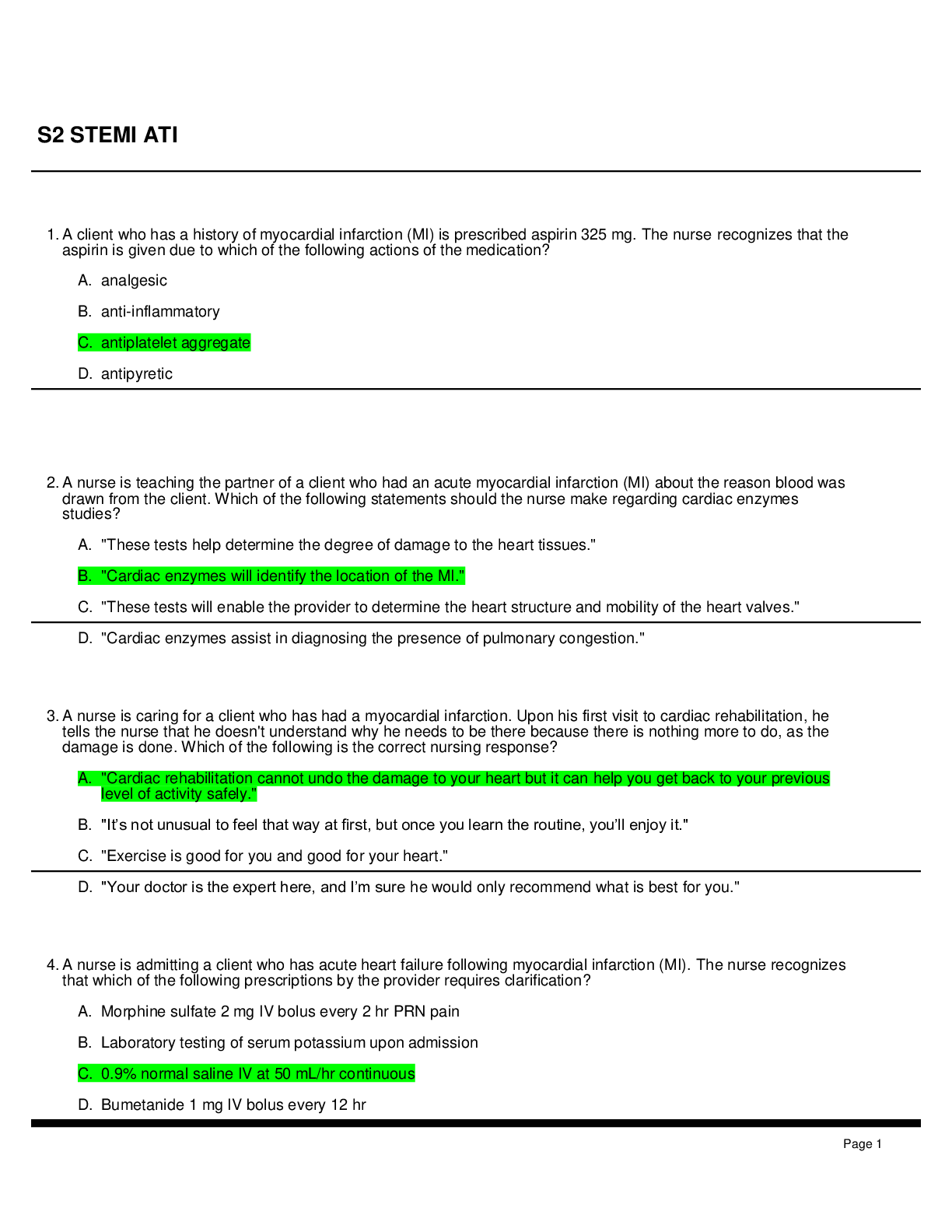
Reviews( 0 )
Document information
Connected school, study & course
About the document
Uploaded On
Aug 14, 2021
Number of pages
6
Written in
Additional information
This document has been written for:
Uploaded
Aug 14, 2021
Downloads
0
Views
26

.png)
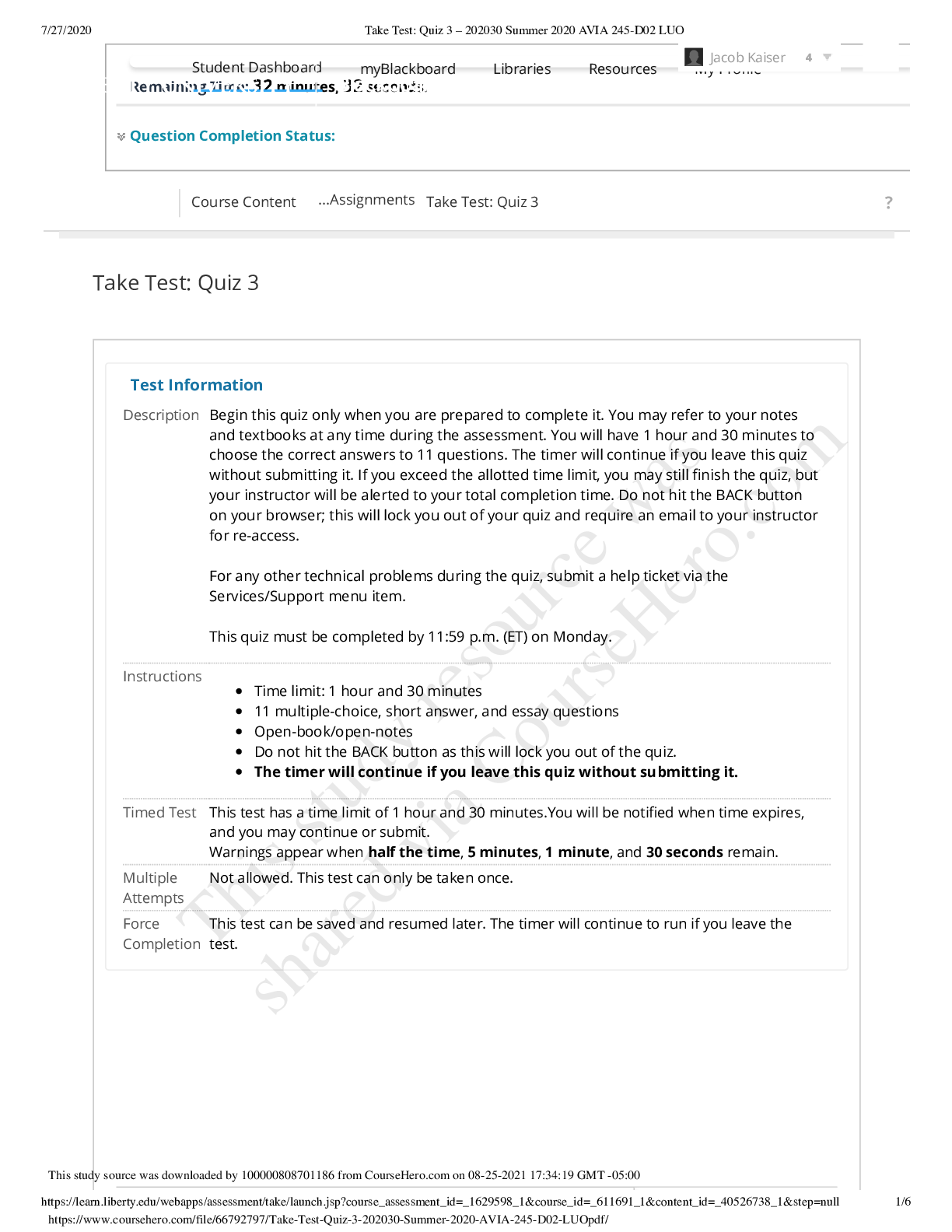
.png)

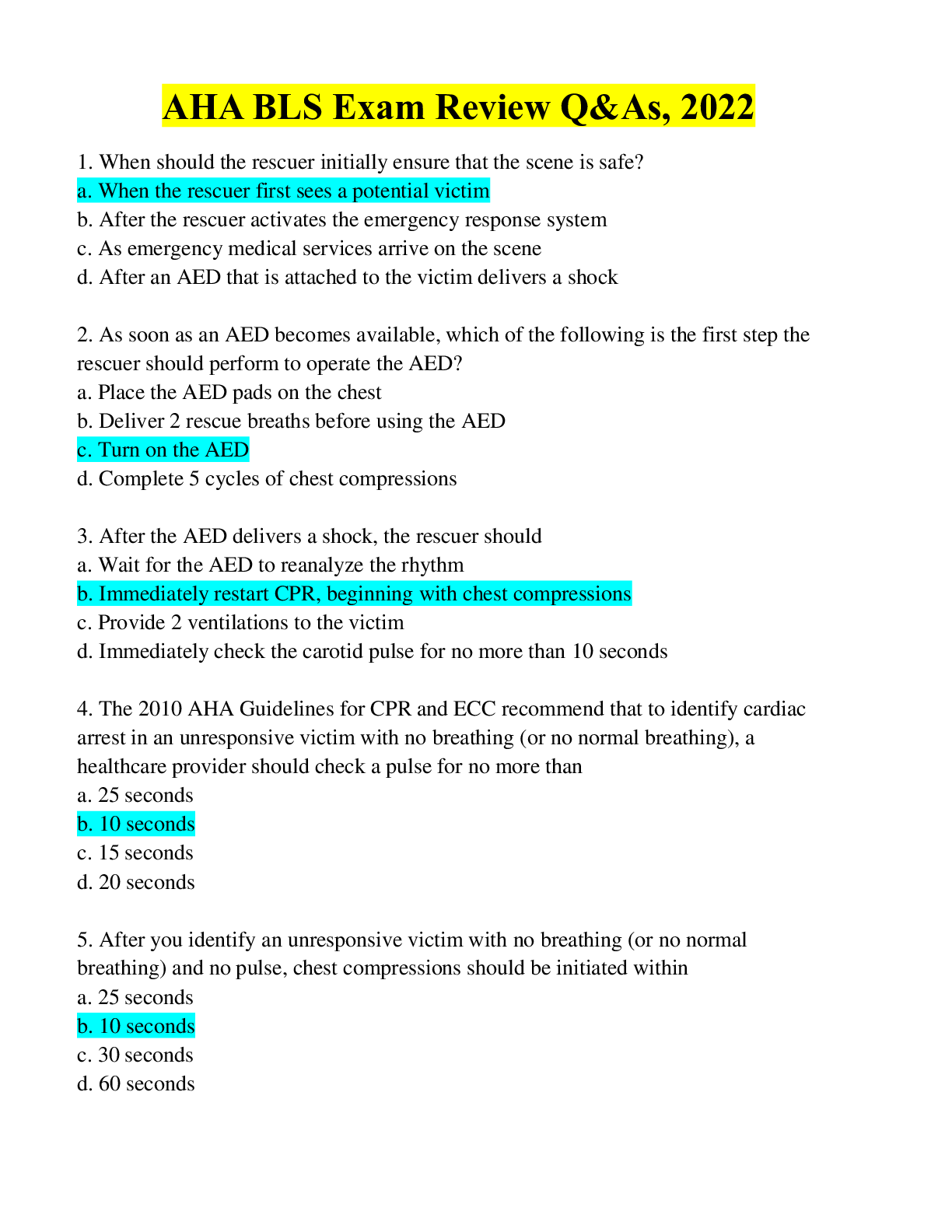
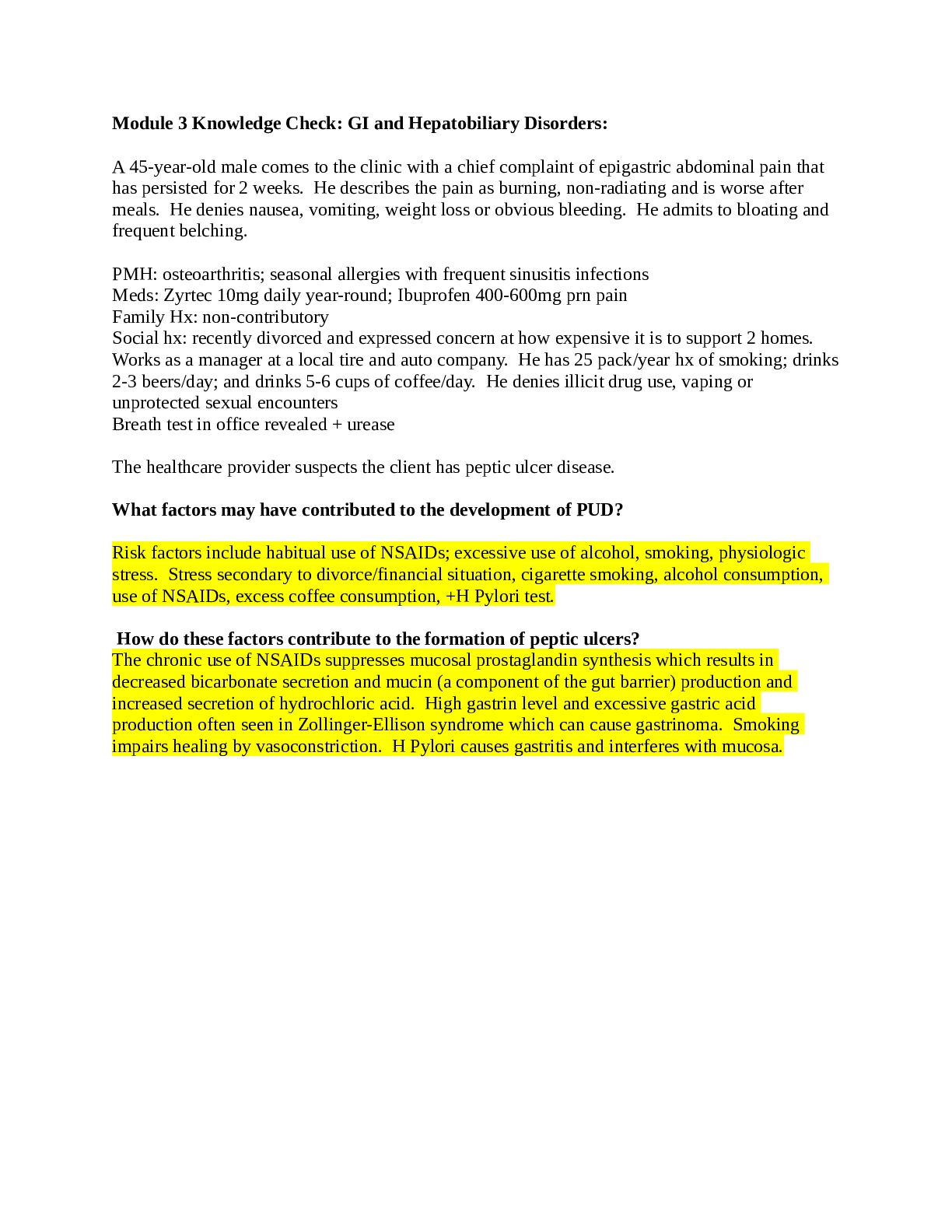
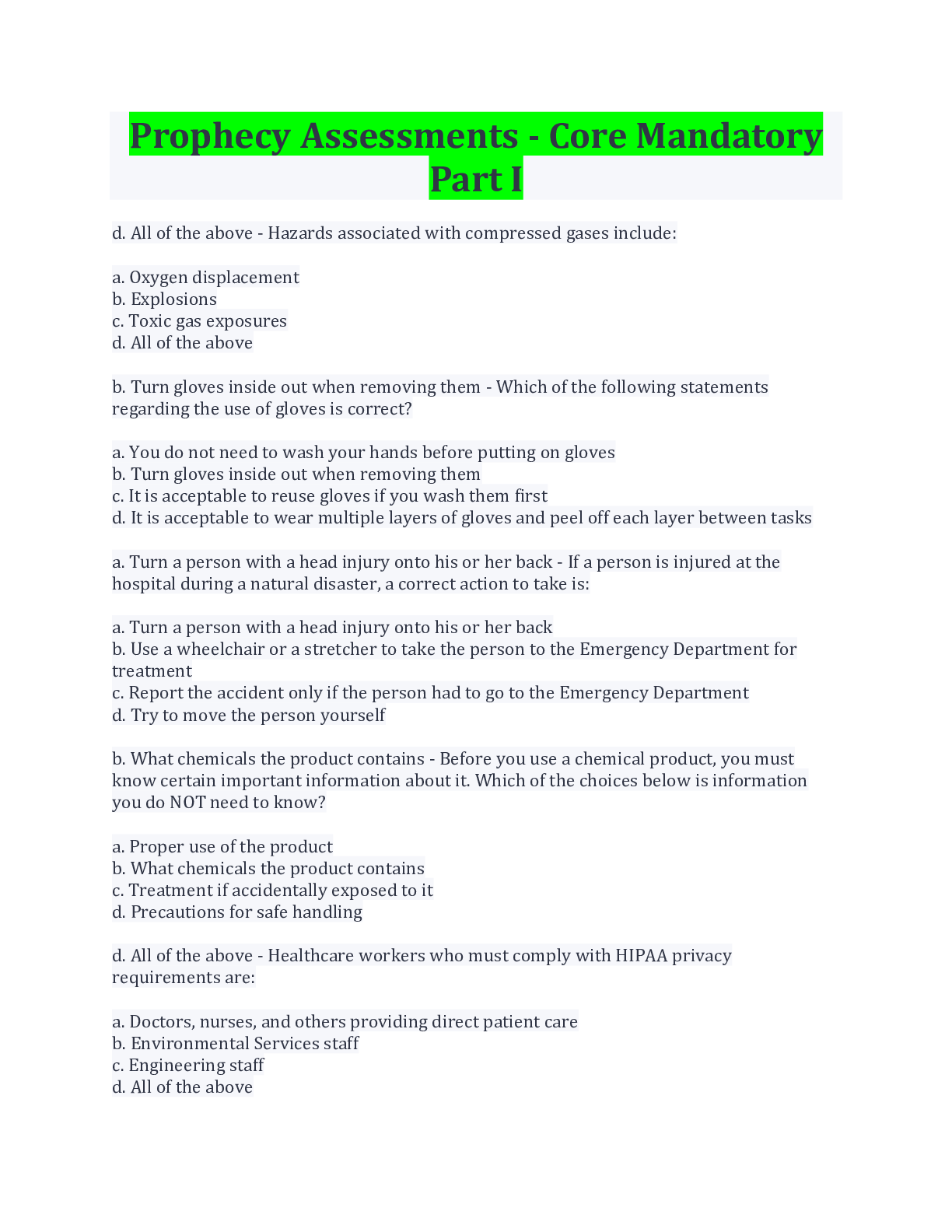
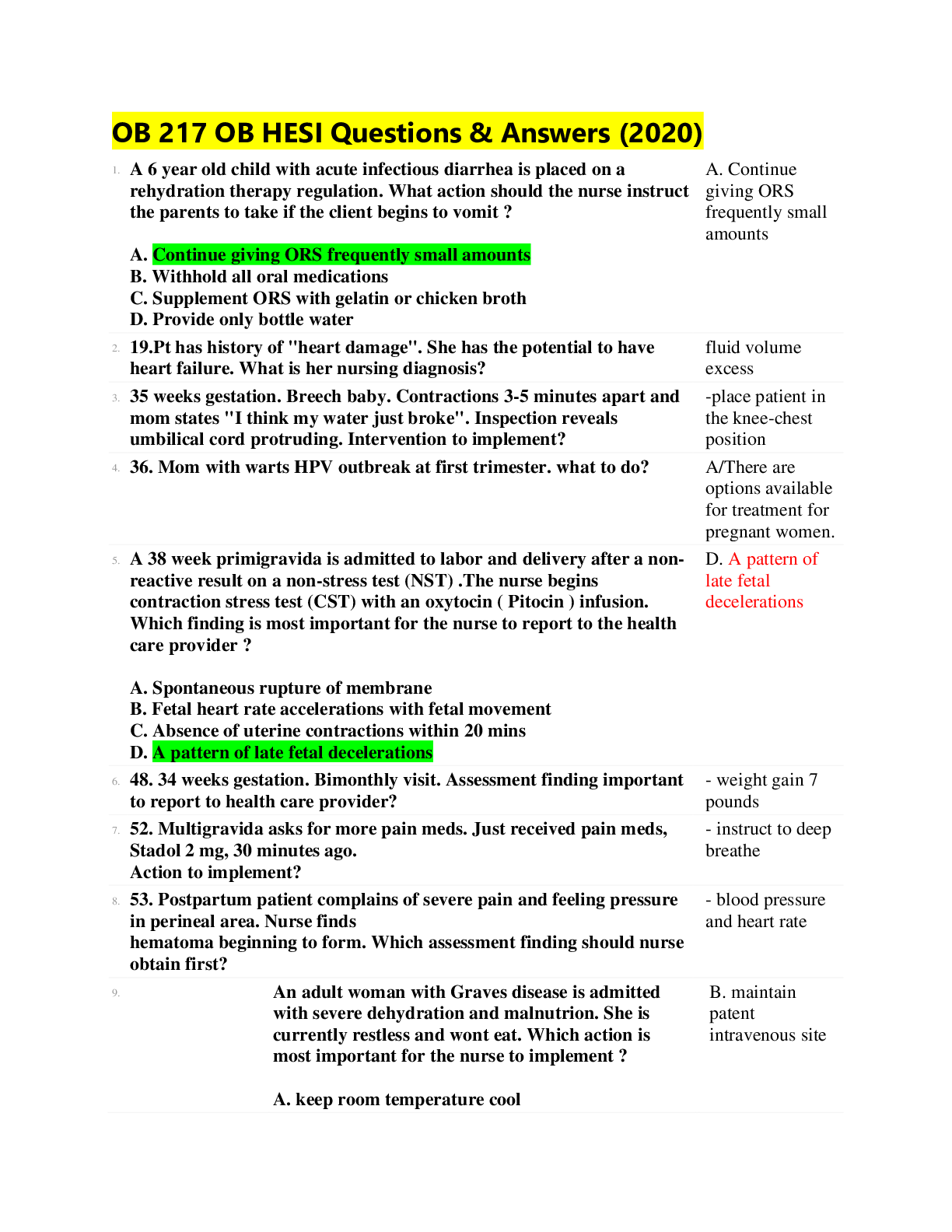
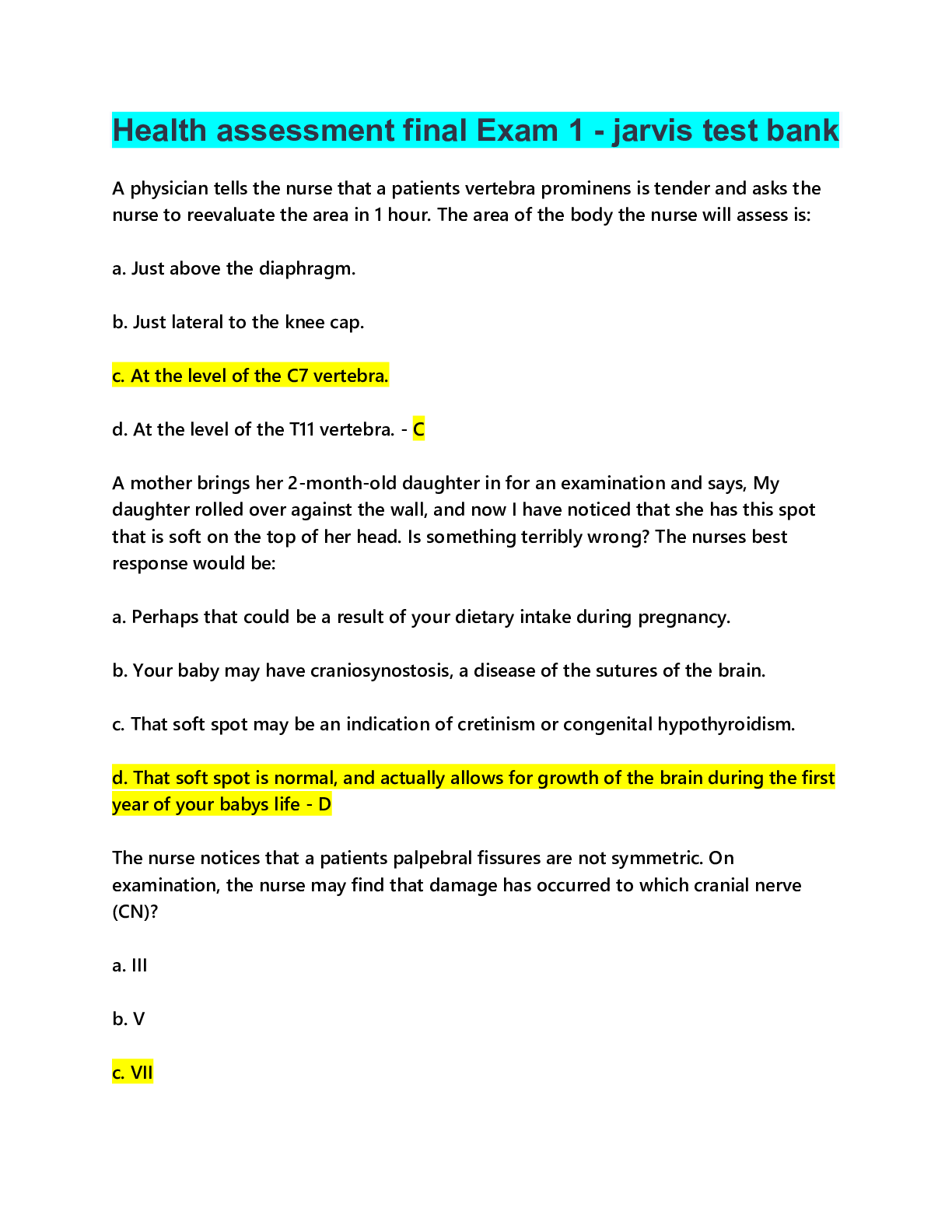
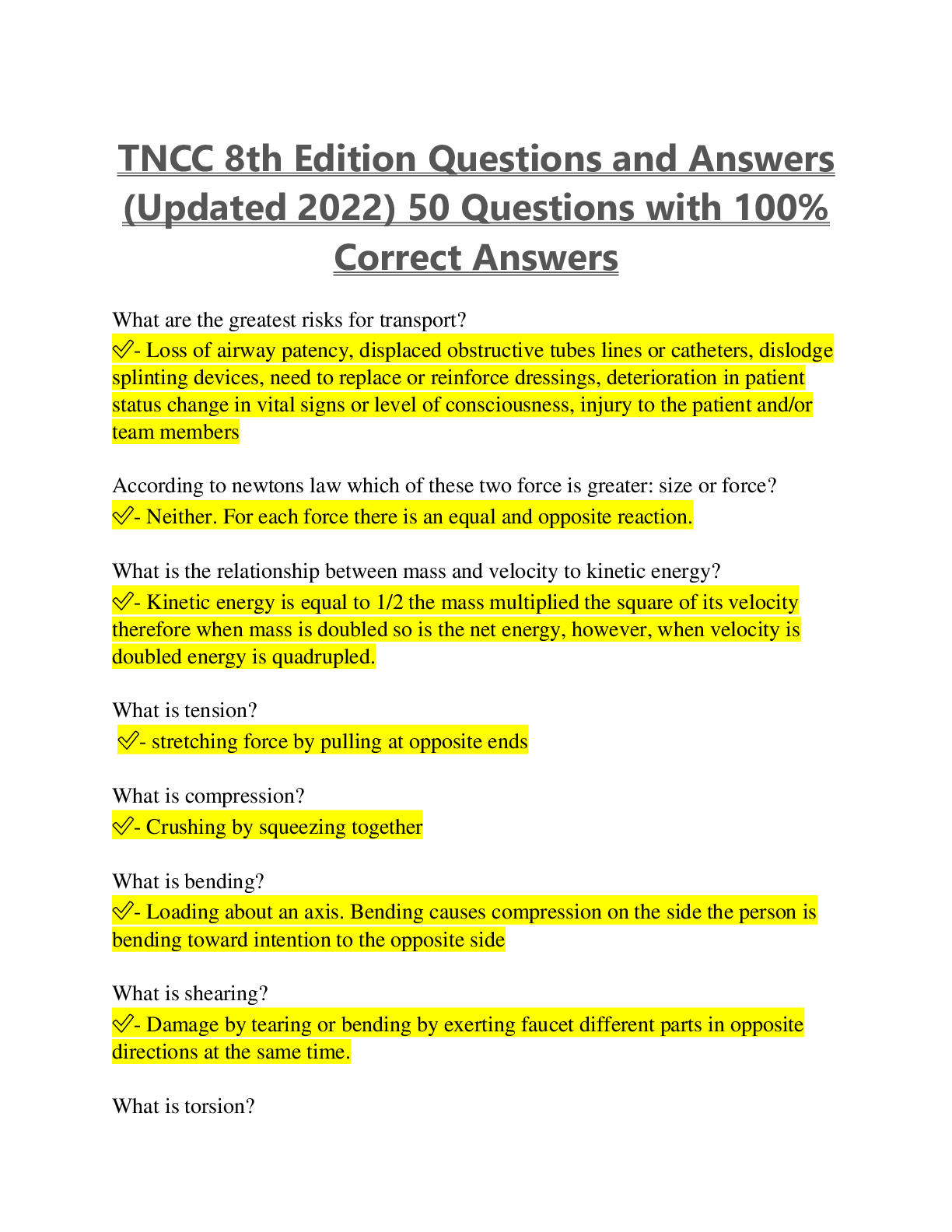
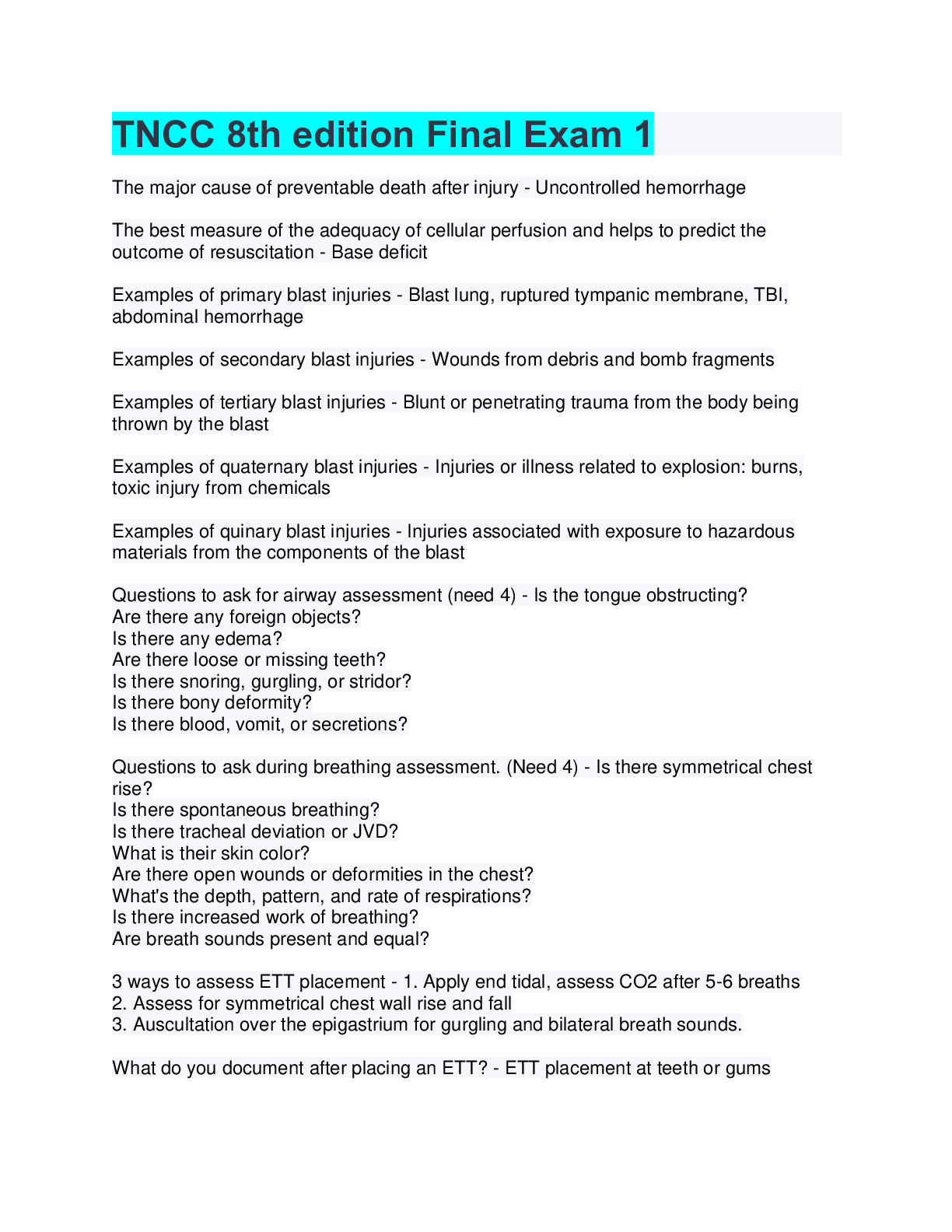
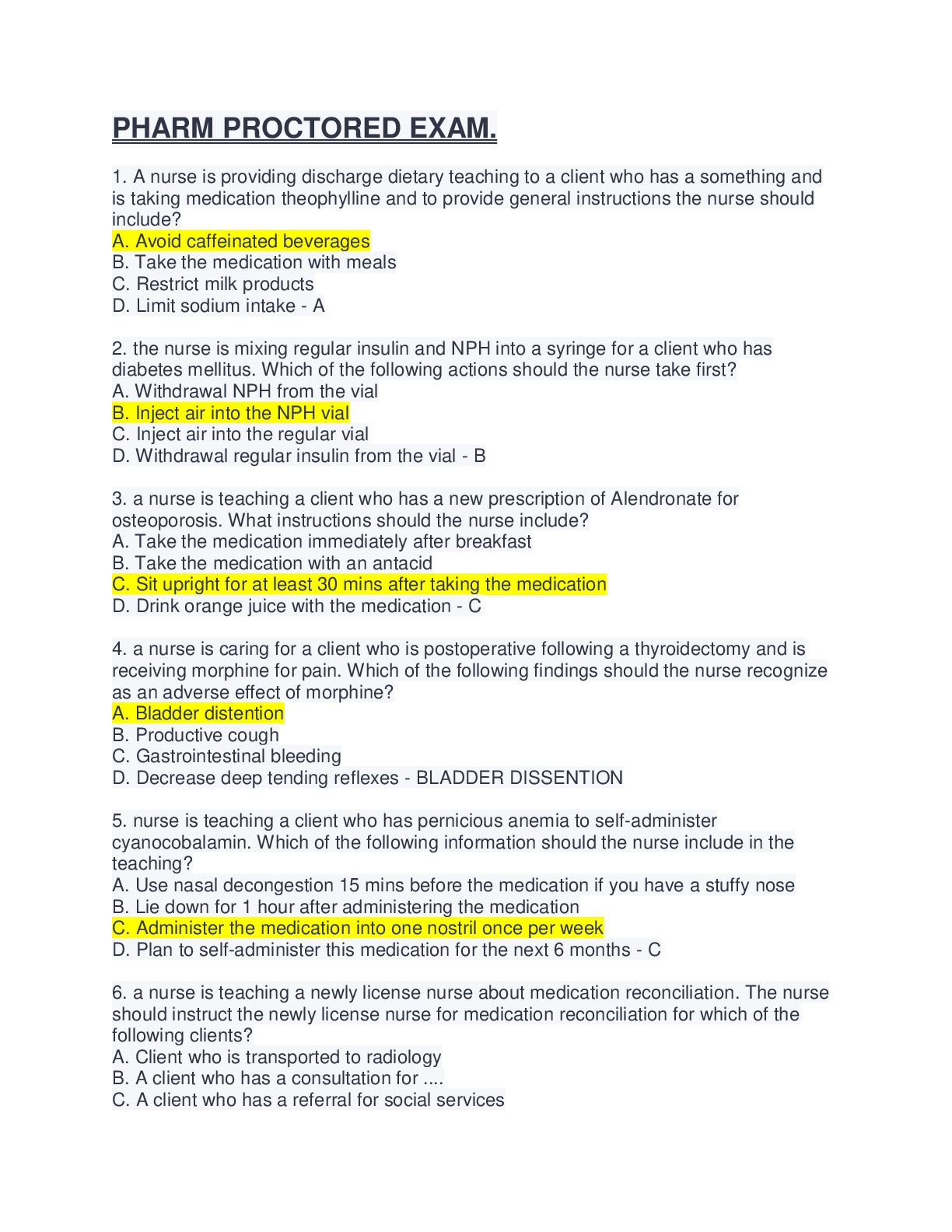



.png)
.png)
.png)

.png)

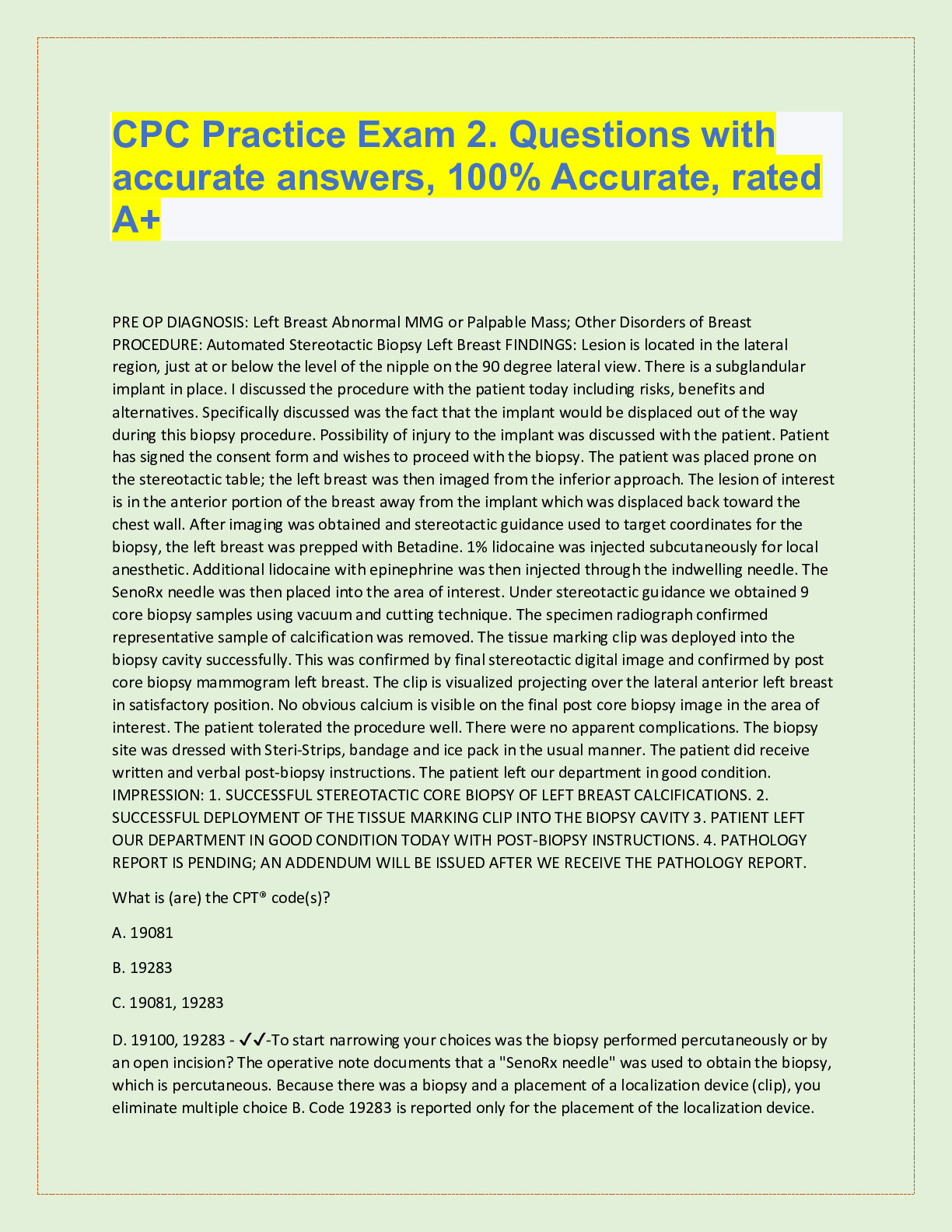
.png)
.png)
.png)
